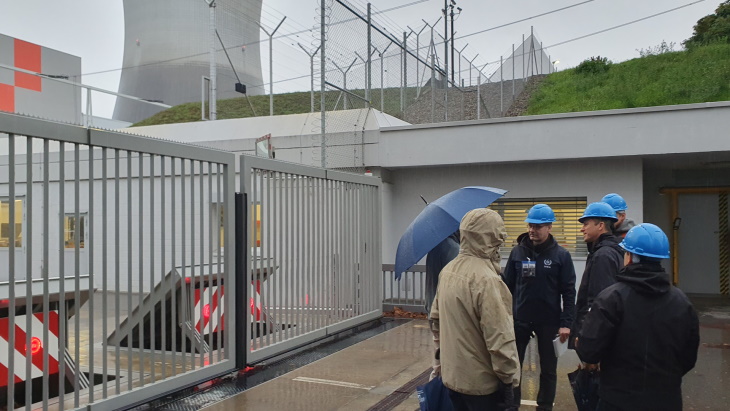IAEA sees enhancement of Swiss nuclear security
An International Atomic Energy Agency (IAEA) team of experts has completed a follow-up nuclear security advisory mission to Switzerland. The International Physical Protection Advisory Service (IPPAS) mission concluded Switzerland has strengthened its nuclear security regime since a mission in 2018.

The IPPAS team visited the Leibstadt nuclear power plant (Image: ENSI)
IPPAS missions are intended to assist IAEA member states in strengthening their national nuclear security regime, providing advice from peers on implementing international instruments and IAEA guidance on the protection of nuclear and other radioactive materials and facilities. They can be conducted on both a nationwide and facility-specific basis.
The latest mission - conducted from 30 October to 10 November - was carried out at the request of the Swiss government and hosted by the Swiss Federal Nuclear Safety Inspectorate (ENSI), the Swiss Federal Office of Energy (SFOE) and the Swiss Federal Office of Public Health (FOPH).
The twelve-day mission concludes the cycle initiated with the IPPAS mission to Switzerland, conducted in 2018. For the first time, this IPPAS mission covered all five modules of the IPPAS programme, with a review of the security of radioactive material, associated facilities and associated activities conducted in addition to reviews of the nuclear security regime, nuclear facilities, transport and information and computer security.
The review team, led by Pedro Lardiez Holgado, Head of the Nuclear Security Division of Spain's Nuclear Safety Council, included eight experts from Belgium, Canada, the Czech Republic, Germany, Spain, Turkey, the UK, the USA and one IAEA staff member.
The team identified significant progress in addressing the findings of the 2018 mission and observed how the nuclear security regime has been enhanced in Switzerland since then. It was noted that Switzerland has a strong nuclear security regime and is committed to continuous improvement in the security of nuclear and other radioactive material.
"The follow-up mission in Switzerland shows its commitment to nuclear security and its openness in receiving an external review of the national nuclear security regime," said Arvydas Stadalnikas, Head of the Integrated Nuclear Security Approaches Unit at the IAEA Division of Nuclear Security. "The inclusion of one additional module on the security of radioactive material underscores Switzerland's integrated approach towards physical protection. The mission's findings indicate a well-established national nuclear security regime and its alignment with the IAEA nuclear security guidance."
ENSI Director General Marc Kenzelmann said: "I would like to thank everyone involved in Switzerland for their great commitment to the extensive preparations and for their dedication during the two-week peer review. We are very grateful to the IPPAS team for their critical scrutiny of the security measures.
"The recommendations of the international experts are extremely important for ENSI, the Federal Office of Public Health, the Swiss Federal Office of Energy and for further partners in the nuclear security domain. We need to work together to systematically and consistently strengthen nuclear security in Switzerland."
Switzerland currently has four nuclear reactors generating about 35% of its electricity.
Researched and written by World Nuclear News
- China Institute of Atomic Energy
- Nuclear Power Institute of China
- Southwestern Institute of Physics
- China Nuclear Power Operation Technology Corporation, Ltd.
- China Nuclear Power Engineering Co., Ltd.
- China Institute for Radiation Protection
- Beijing Research Institute of Uranium Geology (BRIUG)
- China Institute of Nuclear Industry Strategy (CINIS)
- China Nuclear Mining Science and Technology Corporation


